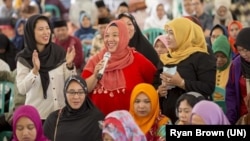There is no doubt that when women participate in conflict resolution and peacebuilding, the chances for just and lasting peace increase. “We know that women’s experiences in conflict, their roles in community leadership and peacebuilding, as well as their technical expertise, make them vital partners at all stages of the peace continuum,” said Elisabeth Millard, United States Acting Deputy Representative to the United Nations.
“When women are at the table and able to participate fully, equally, meaningfully and safely, nations are much more likely to achieve lasting and inclusive peace agreements and better outcomes for all of society.”
Because women’s inclusion is critical for negotiations on lasting peace worldwide, the United Nations Security Council adopted Security Council Resolution 1325 nearly a quarter century ago. The document details the importance of the participation of women and the inclusion of gender perspectives in peace negotiations, humanitarian planning, peacekeeping operations, and post-conflict peacebuilding and governance.
Nonetheless, “We must acknowledge that there are persistent gaps in implementing the global [Women, Peace, and Security, or WPS,] agenda, and there has been a global backsliding on gender equality in recent years,” said Ambassador Millard at last month’s U.N. Peacebuilding Commission meeting in New York.
Despite slow but steady progress toward the integration of women as meaningful participants in peace processes, and as leaders, negotiators, peacekeepers and peacebuilders, the movement appears to be losing ground. A recent United Nations report notes that in 2020, women represented 23 percent of conflict-resolution delegates in U.N.-led or co-led peace processes. That number declined to 19 percent the following year and was only 16 percent in 2022.
“Another obstacle to women’s participation throughout the peace continuum is insufficient funding,” said Ambassador Millard. “The United States reiterates the need for more investment in WPS financing to advance sustainable peace.”
“It is critical that women and youth peacebuilders and their organizations are sufficiently financed, and that women entrepreneurs are empowered to be the agents of change in conflict-afflicted settings.”
Quoting U.N. Secretary-General António Guterres, Ambassador Millard said that “If you want to stand with women driving change, if you want to support women enduring conflict, if you want to remove barriers to participation, and if you want women’s organizations to deliver, we need to pay for it.”
“Underfinancing [the Women, Peace, and Security agenda], she added, “undermines all of our peace initiatives.”
Frustrating Obstacles to Women's Participation in Peacebuilding

“We know that women’s experiences in conflict, their roles in community leadership and peacebuilding, as well as their technical expertise, make them vital partners at all stages of the peace continuum.”


















